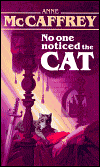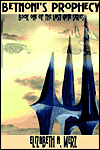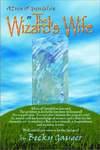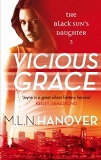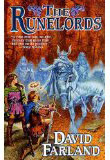
The Runelords, by David Farland
Book Review by Joshua Palmatier
Have you read this book?
The Runelords is the first book in this epic fantasy series from David Farland. I bought this when it first came out in hardcover ages ago--as well as all of the subsequent books--but only just now managed to find time to read it. No real reason for this, just... I own a lot of books that I haven't had a chance to read yet. A lot.
Anyway, the premise: Gaborn is a Runelord, traveling the land toward the allied nation of Sylvarresta with the intent to ask the Princess Iome for her hand. But on the way, he discovers assassins, and an army marching toward Sylvarresta led by Raj Ahten, who seeks to destroy all of the northern lands. Gaborn races to warn the king of Sylvarresta and Iome of the threat, but discovers that more is wrong with the world than a simple army marching on a castle.
For in this world, traits can be passed from one to another through endowments. Brawn, stamina, beauty, wit--all passed from one to another to make a man or woman more than he or she could ever be alone. And Raj Ahten has been forcing people to give him endowments to the point where he may have become more than merely human. He may have become the Sum of All Men, in effect, a god. How can Gaborn and Iome and their fathers hope to defeat him, especially once they learn that the Earth King is dead? Their only chance is for the Earth King to be reborn....
The most interesting aspect of this world, to me, is the concept of the endowments being passed from one person to another, with men literally having the strength of ten men and women the grace of twenty. That idea all by itself is what prompted me to buy the book in the first place. The possibilities there are intriguing, and David Farland uses many of those possibilities in this book. Some are simply strategic--such as linking person to person to create a chain, or to link many people to a single individual, then link that person to another.
What are the advantages and disadvantages of this type of magic system? How can it be used? How can it be abused? All of these are great questions that Farland explores to a great extent in this book. Obviously, Raj Ahten epitomizes the abuse of the magic. The entire book could have dealt with this one magical component and been satisfactory, I believe. I was grateful that the cost of such endowments--how it affected those that gave endowments and those that received them--was made clear, and that these costs had affected the society, creating Dedicate towers and also affecting how wars were fought and battles won. This is what fantasy should be all about--a magical system that changes the world and the people that live in it.
But there were many other magical and epic fantasy components to the book as well. There's the Earth and Fire magic, the two rival factions at odds with each other, woven throughout the story. There were fantastical creatures such as giants and reavers and ferrins, along with hellish elementals and golems. And more mundane magic as well, such as herblore, mixed in with some chemical science. The world itself had multiple layers--varied cultures, richly imagined settings, interesting characters... everything that you'd want and expect in an epic fantasy novel.
My only complaint was with the plot. Overall, it was fine. But it felt a little ragged and loose, not as tight as I expect from an epic fantasy. I don't mean that the plot was sprawling--in fact, it was kept down to a manageable number of main characters to follow (there were only two major POV characters to follow, with a couple of jaunts into other POV characters once in while). What I mean is that it felt like some plot threads were started and then left hanging or went nowhere. For example, Gaborn is in the castle, escapes outside it's walls, then returns, then escapes again... couldn't this have been cut to just one escape? Especially when I didn't see the point of the first escape?
In any event, a few plot threads do similar things, going nowhere and then returning. And in the end, when the book was finished, I didn't feel a sense of completion. It didn't feel like a significant objective had been achieved. It felt more like the story had just started and we had simply finished part one.
So I enjoyed the world building and the extremely intriguing premise of endowments being passed from person to person and the potential (and cost) of such a magic. I was less impressed with the overall plot of the book, which left me a little unsatisfied at the end. I'll be reading the second book, because the world is so interesting, but I'm hoping that we get a slightly more coherent and satisfactory story in the next one.
Joshua Palmatier/Benjamin Tate
www.joshuapalmatier.com
www.benjamintate.com
Anyway, the premise: Gaborn is a Runelord, traveling the land toward the allied nation of Sylvarresta with the intent to ask the Princess Iome for her hand. But on the way, he discovers assassins, and an army marching toward Sylvarresta led by Raj Ahten, who seeks to destroy all of the northern lands. Gaborn races to warn the king of Sylvarresta and Iome of the threat, but discovers that more is wrong with the world than a simple army marching on a castle.
For in this world, traits can be passed from one to another through endowments. Brawn, stamina, beauty, wit--all passed from one to another to make a man or woman more than he or she could ever be alone. And Raj Ahten has been forcing people to give him endowments to the point where he may have become more than merely human. He may have become the Sum of All Men, in effect, a god. How can Gaborn and Iome and their fathers hope to defeat him, especially once they learn that the Earth King is dead? Their only chance is for the Earth King to be reborn....
The most interesting aspect of this world, to me, is the concept of the endowments being passed from one person to another, with men literally having the strength of ten men and women the grace of twenty. That idea all by itself is what prompted me to buy the book in the first place. The possibilities there are intriguing, and David Farland uses many of those possibilities in this book. Some are simply strategic--such as linking person to person to create a chain, or to link many people to a single individual, then link that person to another.
What are the advantages and disadvantages of this type of magic system? How can it be used? How can it be abused? All of these are great questions that Farland explores to a great extent in this book. Obviously, Raj Ahten epitomizes the abuse of the magic. The entire book could have dealt with this one magical component and been satisfactory, I believe. I was grateful that the cost of such endowments--how it affected those that gave endowments and those that received them--was made clear, and that these costs had affected the society, creating Dedicate towers and also affecting how wars were fought and battles won. This is what fantasy should be all about--a magical system that changes the world and the people that live in it.
But there were many other magical and epic fantasy components to the book as well. There's the Earth and Fire magic, the two rival factions at odds with each other, woven throughout the story. There were fantastical creatures such as giants and reavers and ferrins, along with hellish elementals and golems. And more mundane magic as well, such as herblore, mixed in with some chemical science. The world itself had multiple layers--varied cultures, richly imagined settings, interesting characters... everything that you'd want and expect in an epic fantasy novel.
My only complaint was with the plot. Overall, it was fine. But it felt a little ragged and loose, not as tight as I expect from an epic fantasy. I don't mean that the plot was sprawling--in fact, it was kept down to a manageable number of main characters to follow (there were only two major POV characters to follow, with a couple of jaunts into other POV characters once in while). What I mean is that it felt like some plot threads were started and then left hanging or went nowhere. For example, Gaborn is in the castle, escapes outside it's walls, then returns, then escapes again... couldn't this have been cut to just one escape? Especially when I didn't see the point of the first escape?
In any event, a few plot threads do similar things, going nowhere and then returning. And in the end, when the book was finished, I didn't feel a sense of completion. It didn't feel like a significant objective had been achieved. It felt more like the story had just started and we had simply finished part one.
So I enjoyed the world building and the extremely intriguing premise of endowments being passed from person to person and the potential (and cost) of such a magic. I was less impressed with the overall plot of the book, which left me a little unsatisfied at the end. I'll be reading the second book, because the world is so interesting, but I'm hoping that we get a slightly more coherent and satisfactory story in the next one.
Joshua Palmatier/Benjamin Tate
www.joshuapalmatier.com
www.benjamintate.com
|
Click here to buy The Runelords, by David Farland on Amazon
|
The Runelords, by David Farland on Amazon

| More Books You Might Like |
Comment on The Runelords, by David Farland
| Comments on The Runelords, by David Farland |
| There are no comments on this book. |
